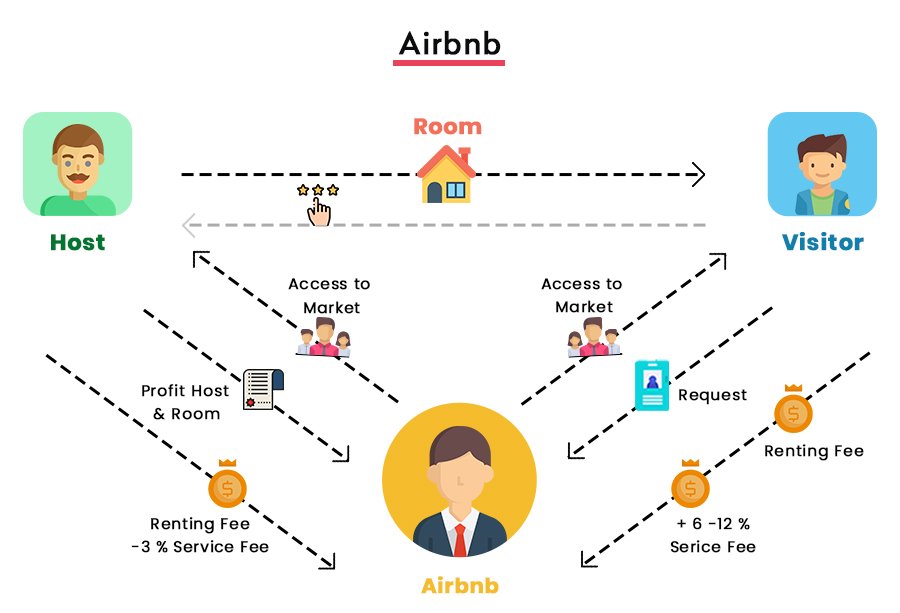The Airbnb business model has transformed the way people travel, stay, and experience the world. Since its launch in 2008, Airbnb has grown from a small startup renting out air mattresses to a global platform connecting millions of travelers and hosts. But how did Airbnb disrupt the travel industry so effectively? In this article, we’ll explore the core elements of the Airbnb business model, how it benefits hosts and guests, and why it continues to shape the future of travel.
What Is the Airbnb Business Model?
The Airbnb business model is a peer-to-peer platform that allows people to rent out their homes, apartments, or even spare rooms to travelers. Unlike traditional hotels, Airbnb offers a more personal, often more affordable, and culturally rich experience.
Here’s a simple breakdown of how it works:
- Hosts list their properties on Airbnb.
- Guests browse listings, book stays, and pay through the platform.
- Airbnb earns revenue by taking a percentage from both the guest and the host per booking.
This model relies heavily on trust, reviews, and user-generated content, allowing it to scale quickly without owning any actual properties.
The Origins of Airbnb

Airbnb was founded by Brian Chesky, Joe Gebbia, and Nathan Blecharczyk in San Francisco. The idea came when the founders needed to make rent and decided to rent out air mattresses in their apartment to attendees of a local design conference.
That simple idea—“air bed and breakfast”—became a powerful platform, giving travelers a new alternative to hotels and giving property owners a way to make extra income.
How Airbnb Makes Money
The key to Airbnb’s profitability lies in its commission-based model:
- Guest Service Fee: Around 14% is added to the booking subtotal.
- Host Service Fee: Usually 3% of the booking price is deducted from the host’s payout.
With millions of bookings taking place every year across over 220 countries, this model generates billions in annual revenue without the need for physical assets.
Why the Airbnb Business Model Works
Several elements make the Airbnb business model so effective:
1. Asset-Light Strategy
Airbnb doesn’t own any of the homes listed on its site. This reduces overhead and allows for rapid scaling.
2. Two-Sided Marketplace
Airbnb connects two groups: guests looking for places to stay and hosts with properties to rent. This balance of supply and demand is crucial to its success.
3. Trust and Transparency
Reviews, ratings, and verified IDs build trust between users. The platform has created a community where both parties can feel safe and confident.
4. Flexible and Scalable
Airbnb can operate globally without needing a local physical presence. All it needs is internet access and local hosts.
Airbnb vs. Traditional Hotels
The Airbnb business model disrupted the hotel industry in multiple ways:
| Feature | Airbnb | Hotels |
|---|---|---|
| Personal Experience | Local, unique, home-like | Standardized, professional |
| Cost | Often cheaper | More expensive, especially in cities |
| Flexibility | More variety in stay duration | Usually rigid check-in/check-out |
| Host Interaction | Direct with owner | Front desk only |
| Amenities | Varies widely | Generally consistent |
Airbnb appeals especially to younger travelers, digital nomads, and families looking for something beyond the typical hotel experience.
Benefits for Hosts

For many, becoming an Airbnb host has become a steady income stream or even a full-time business. Here are some key benefits:
- Extra Income: Hosts can rent out unused space and earn money.
- Flexible Schedule: Hosts choose when and how often to rent out their space.
- Control Over Pricing: Airbnb allows hosts to set their own nightly rates and minimum stay durations.
- Support and Protection: Airbnb provides a Host Guarantee program and customer service support.
Risks and Challenges for Hosts
While the Airbnb business model offers many benefits, it also comes with challenges:
- Maintenance and Cleanliness: Hosts must ensure high standards to maintain positive reviews.
- Regulations: Many cities have implemented short-term rental laws, which can limit or restrict Airbnb hosting.
- Guest Issues: While rare, hosts may deal with damages or troublesome guests.
To be successful, hosts must manage their properties like a small business.
Impact of Airbnb on Local Communities
The growth of Airbnb has created economic opportunities but also raised concerns in some communities:
Positive Impact:
- Boosts local economies through tourism spending.
- Provides income to residents.
- Encourages home renovations and property investments.
Negative Impact:
- Can drive up housing costs in some areas.
- Leads to complaints from neighbors about noise or traffic.
- Changes the character of residential neighborhoods.
Some cities have responded by placing limits on short-term rentals to balance the benefits and drawbacks.
Airbnb’s Adaptability: How It Survived the Pandemic
When the COVID-19 pandemic halted travel in 2020, Airbnb faced serious challenges. But it quickly adapted:
- Shifted focus to longer stays for remote workers and students.
- Highlighted local travel to avoid international restrictions.
- Improved cleaning standards to reassure guests.
- Offered online experiences like cooking classes and guided tours via Zoom.
This ability to pivot during a crisis proved the strength and flexibility of the Airbnb business model.
What Makes Airbnb Different?
Here are a few factors that help Airbnb stand out:
- Community-Focused: Hosts and guests are more than customers; they’re part of a global network.
- Technology-Driven: Easy-to-use apps and tools for booking, messaging, and payments.
- Experiential Travel: Airbnb offers more than just a place to stay—it offers local experiences and a deeper connection with the destination.
- Sustainability Initiatives: Airbnb promotes eco-friendly stays and supports hosts who use sustainable practices.
The Future of the Airbnb Business Model
As the world continues to evolve, Airbnb is exploring new opportunities:
- Business Travel: Tailoring services for professionals on the go.
- Co-Living Spaces: Long-term stays for digital nomads.
- Airbnb Experiences: Expanding into guided tours, cooking classes, and other local activities.
- AI and Automation: Enhancing guest recommendations and streamlining host management.
Despite challenges, Airbnb is well-positioned for long-term success by staying innovative and guest-focused.
Tips for New Airbnb Hosts
Thinking of becoming an Airbnb host? Here are a few tips to get started:
- Start Small: List a spare room before renting out an entire home.
- Take Great Photos: Quality images attract more bookings.
- Set Competitive Prices: Research local rates to stay attractive.
- Communicate Clearly: Respond quickly and honestly to guest inquiries.
- Maintain Cleanliness: Cleanliness is a top priority for guests.
Conclusion: A New Way to Travel
The Airbnb business model has revolutionized the way people travel. By empowering individuals to open their homes to guests around the world, it created a more connected, affordable, and personalized form of travel. Whether you’re a traveler looking for unique experiences or a host hoping to earn extra income, Airbnb offers opportunities that didn’t exist before.
Read Next – Smyrna Beach Explosion Shakes Neighborhood, Sparks Investigation






